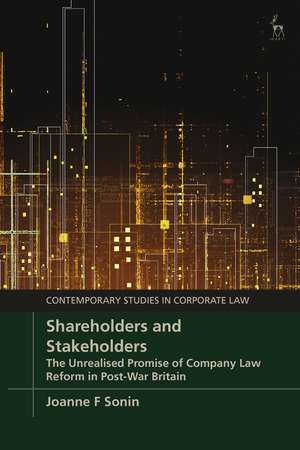Shareholders and Stakeholders: The Unrealised Promise of Company Law Reform in Post-War Britain: Contemporary Studies in Corporate Law
Autor Joanne F Soninen Limba Engleză Hardback – 6 sep 2023
Din seria Contemporary Studies in Corporate Law
- 27%
 Preț: 349.98 lei
Preț: 349.98 lei - 18%
 Preț: 304.86 lei
Preț: 304.86 lei - 30%
 Preț: 541.93 lei
Preț: 541.93 lei - 37%
 Preț: 542.93 lei
Preț: 542.93 lei - 30%
 Preț: 571.50 lei
Preț: 571.50 lei - 30%
 Preț: 571.24 lei
Preț: 571.24 lei - 14%
 Preț: 571.57 lei
Preț: 571.57 lei - 30%
 Preț: 539.18 lei
Preț: 539.18 lei - 30%
 Preț: 538.26 lei
Preț: 538.26 lei - 19%
 Preț: 310.68 lei
Preț: 310.68 lei - 18%
 Preț: 306.94 lei
Preț: 306.94 lei - 18%
 Preț: 307.32 lei
Preț: 307.32 lei - 18%
 Preț: 322.15 lei
Preț: 322.15 lei - 18%
 Preț: 304.66 lei
Preț: 304.66 lei - 30%
 Preț: 510.83 lei
Preț: 510.83 lei - 18%
 Preț: 306.94 lei
Preț: 306.94 lei
Preț: 512.87 lei
Preț vechi: 732.65 lei
-30% Nou
Puncte Express: 769
Preț estimativ în valută:
98.14€ • 102.83$ • 81.13£
98.14€ • 102.83$ • 81.13£
Carte tipărită la comandă
Livrare economică 12-26 aprilie
Preluare comenzi: 021 569.72.76
Specificații
ISBN-13: 9781509966806
ISBN-10: 1509966803
Pagini: 328
Dimensiuni: 156 x 234 x 26 mm
Greutate: 0.64 kg
Editura: Bloomsbury Publishing
Colecția Hart Publishing
Seria Contemporary Studies in Corporate Law
Locul publicării:London, United Kingdom
ISBN-10: 1509966803
Pagini: 328
Dimensiuni: 156 x 234 x 26 mm
Greutate: 0.64 kg
Editura: Bloomsbury Publishing
Colecția Hart Publishing
Seria Contemporary Studies in Corporate Law
Locul publicării:London, United Kingdom
Caracteristici
Focuses on the questions of shareholder and stakeholder interests in a historical period, the post-war consensus, that is under-examined yet fundamentally important to understanding subsequent periods, from the rise of Thatcherism through to today
Notă biografică
Joanne F Sonin is a finance professional with a PhD from London School of Economics and Political Science, UK.
Cuprins
1. IntroductionThe Post-War EraThematic OutlineStructural Outline2. Nationalisations and the Post-War ShareholderThe Post-War ConsensusSupport for Radical Reform or Cyclical Change?Nationalisations and the Four Levers of the British EconomyNationalisations and Equity ShareholdersReactions to Post-War NationalisationsFinancial and Economic Implications of NationalisationsNationalisation's Impact on the Relationship between Shareholders and DirectorsInstitutional Investors and NationalisationsThe Faltering Post-War Consensus and State InterventionsThe Financial Crash, Equity Shareholders, and NationalisationsBritain's Pivot to Thatcherism3. The Post-War Shareholder Body and Shareholder DemocracyPost-War Perceptions of the ShareholderTypes of ShareholdersThe Evolution of the Forms of ShareholdingThe Development of Shareholder Democracy4. Corporate Purpose and the ShareholderShareholder Primacy and Shareholder DemocracyEnlightened Shareholder ValueConflicting Interests and the Call for ReformThe UK CourtsPressures on the Principle of Shareholder Primacy5. Industrial Democracy and the Worker ShareholderPost-War Reconstruction and the Movement for Industrial DemocracyMotivations for Support of Industrial DemocracyBritish Industry and a Changing WorkforceImpediments to Widespread Worker ShareholdingWorkers' Attitudes to Savings and Equity OwnershipWorker Uptake6. Industrial Democracy and the Worker DirectorThe Trade Unions and Worker RepresentationCapital and Labour: Conflict or Convergence?Industrial Democracy and Legislative ChangeThe Unrealised Potential of Post-War Industrial Democracy7. The Bullock Committee: A Paper-Tiger Attack on the SystemEstablishing the Committee of EnquiryThe TUC, the Majority Report and the Minority ReportBullock Report and Shareholder Primacy(Re)defining Directors' DutiesPolitical Resistance to the TUC Proposals and the Bullock ReportThe City and IndustryThe End of the Post-War Consensus and the Diminishing of Industrial Democracy8. Post-1979: Shareholders, Stakeholders and the Companies ActThe End of the Post-War Consensus1979: The End of the Post-War Settlement and the Election of Margaret ThatcherCompanies Act 1980Companies Act 1985Thatcher's Big Bang and the Financial Services Act 1986New Labour's 'Third Way' and the Companies ActThe Company Law Review Steering CommitteeShareholders, Stakeholders and UK Corporate GovernanceThe Company Law Reform Bill and the Companies Act 20069. Contemporary Corollaries and Concluding ConsiderationsContemporary RelevanceCorporate Purpose: A Note on Contemporary ParallelsConcluding Thoughts
